Heavy Metal Pollution Investigation in 25 Villages Henan Puyang

The Central Committee of the Communist Party of China and the State Council’s directive on intensifying the pollution control battle states: “By 2025, the emissions of key heavy metals pollutants in key industries nationwide will be reduced by 5% compared to 2020.”
Why does China’s largest power battery factory, with an annual revenue exceeding 100 billion, not hire unmarried workers?
The public reflects: “Those who work at the Tianneng Battery Factory are those who have decided not to have children. Regardless of gender, going there will result in loss of fertility.”
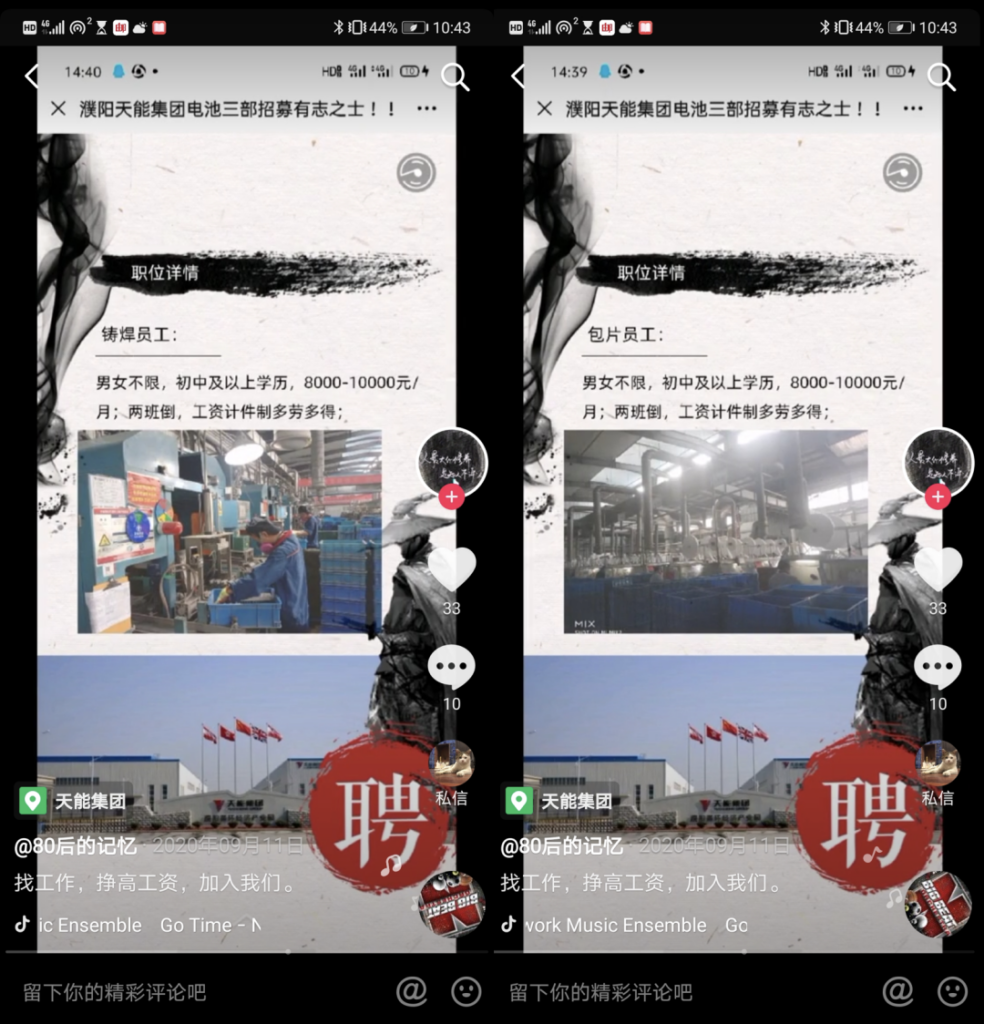


“Where is the location?
Are they still hiring?”
“How much is the salary?”
Searching for “Puyang Battery Factory” on short video platforms, one can find such typical inquiries about recruitment in the comment sections. However, there are also some less typical voices among them.
“I heard they don’t let unmarried people in, why is that?”
“I went there last time, and they didn’t want unmarried people!”
This reflects the situation at Tianneng Group’s battery factory in Puyang, Henan. Despite seeming like workplace discrimination, there’s another truth behind not hiring unmarried employees. The area around Puyang Industrial Park, shrouded in the shadow of heavy metal pollution led by lead, is suspected of causing infertility in people and preventing beans from forming seeds.
Henan Puyang Heavy Metal Pollution Investigation in 25 Villages
“A Pollution-Free Battery Factory Safer Than Preserved Eggs?”
1
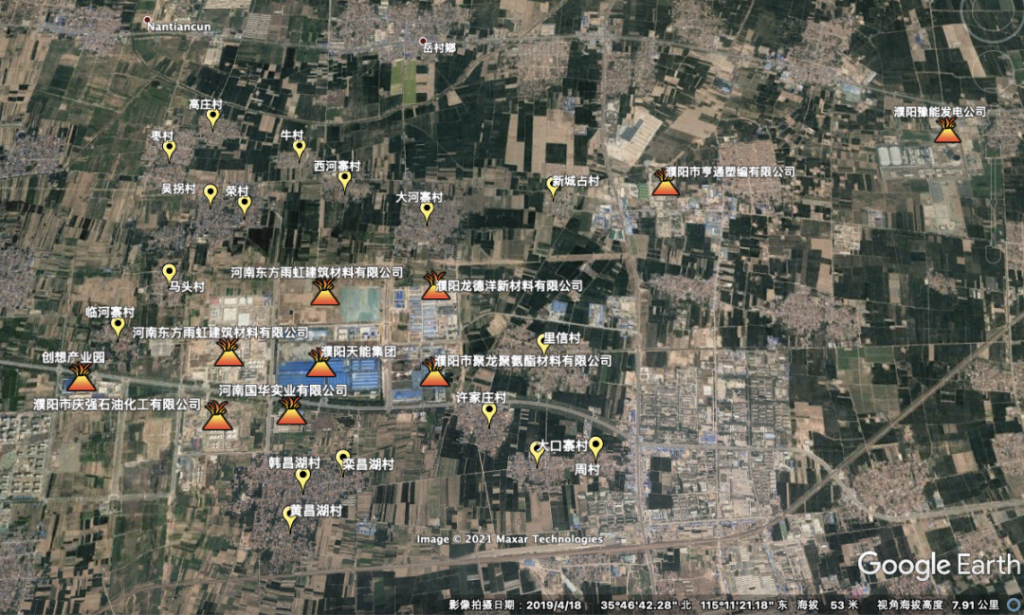
The Puyang Industrial Park, comprising industry leaders such as Tianneng Group, Punai Shares, Oriental Yuhong, and Haier Xi, builds on the chemical resource advantages and the demand for transformation and upgrading to establish a 6 square kilometer “China Puyang Green Coatings Industrial Park.” Commonly found in electronic products, toys, study tools, and inferior household decoration paints and printing inks, excessive lead harmful to human health has been a concern. A survey by the domestic environmental organization “Toxin Pioneer” in the second half of 2021 revealed that many wood varnishes sold on major e-commerce platforms like Taobao, JD.com, and Pinduoduo had lead content exceeding the standards.

Within the Puyang Industrial Park, the standout Tianneng Group Energy Technology Co., Ltd., a leading representative, primarily manufactures storage batteries and is China’s largest power battery company. Reports indicate that during the production process, the factory’s lead emissions exceeded standards, leading to health problems among employees.
In 2013, Tianneng Group’s production base in Shuyang, Jiangsu, was exposed by multiple media outlets for a lead pollution incident.
Despite extensive reports on pollution at Tianneng Group’s Shuyang base, local Shuyang County departments reported that soil, water, air, and noise levels around the base met national standards. Two villagers conducted their own blood lead tests and published the results online, which contradicted official data, leading to charges of “picking quarrels and provoking trouble.” It was even claimed that these villagers fed children preserved eggs to elevate their blood lead levels intentionally. This led to the absurd claim that the battery company was “safer than preserved eggs” and “pollution-free.” The question arises whether Tianneng Battery Factory in Puyang Industrial Park faces similar pollution issues, prompting on-site investigations.
2
From air to soil to food, pollution is everywhere.
25 villages, 30,000 people are threatened by pollution, impacting their health and life over the years.
We extracted samples of wheat and soil from five villages, namely Luanchanghu Village (0.55km), Zhoucun Village (1.87km), Dakouzhai Village (1.20km), Xihezhai Village (1.49km), and Rong Village (1.28km). Within a radius of two kilometers from each village, we found that samples of wheat, guava fruits, honeysuckle, and other plants, as well as soil samples, were severely contaminated with lead.
(1) Five randomly selected wheat samples were tested, referring to the national standard GB 2762-2017 for food safety, with a standard of 0.2mg/kg for grains. All samples exceeded the standard: The lead content in wheat husk samples from Luanchanghu Village was detected at 2.72mg/kg, exceeding the standard limit value of 0.2mg/kg for grains according to the “GB2762-2017 National Food Safety Standard for Contaminants in Food,” by 13.6 times. In Xihezhai Village, the lead content in wheat husk was measured at 3.76mg/kg, exceeding the standard by 18.8 times. In Da Kou Zhai Village, Puyang, Henan Province, wheat sample No. 2 was found to have a lead content of 0.45mg/kg, exceeding the standard by 2.25 times. Wheat sample No. 3 from Da Kou Zhai Village was found to have a lead content of 0.49mg/kg, exceeding the standard by 2.45 times. In Zhoucun Village, the lead content in wheat husk was 1.59mg/kg, exceeding the standard by 7.95 times.
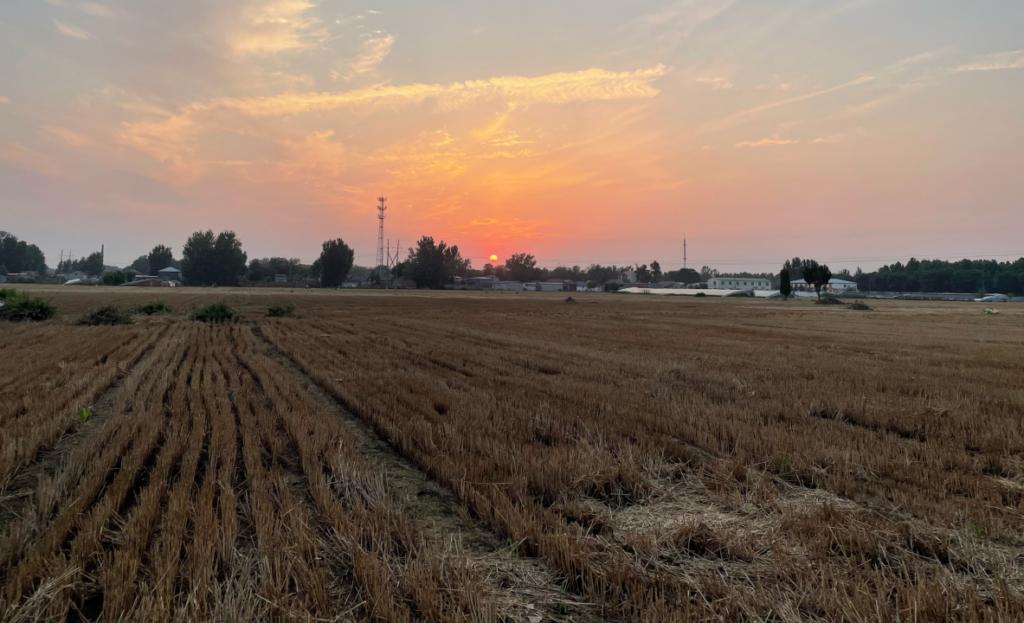

Wheat samples from Xihezhai Village exceeded the lead standard by the highest factor of 18.8 times
(2)Refer to GB 2762-2017 National Standard for Food Safety 5mg/kg for similar tea and dried chrysanthemum products in the limit of contaminants in foodstuffs, Honeysuckle lead exceeds the standard by 1.1 times.



(3)The lead content detected in walnuts is 0.3mg/kg. Referring to the national standard GB 2762-2017, the standard for pollutants in food, the limit for berries is 0.2mg/kg.Local fresh walnuts exceed lead limit by 1.5 times


(4)Referring to the national standard GB 2762-2017, the standard for pollutants in food, the limit for berries is 0.2mg/kg,Local tree fruits exceed lead limit by 63 times

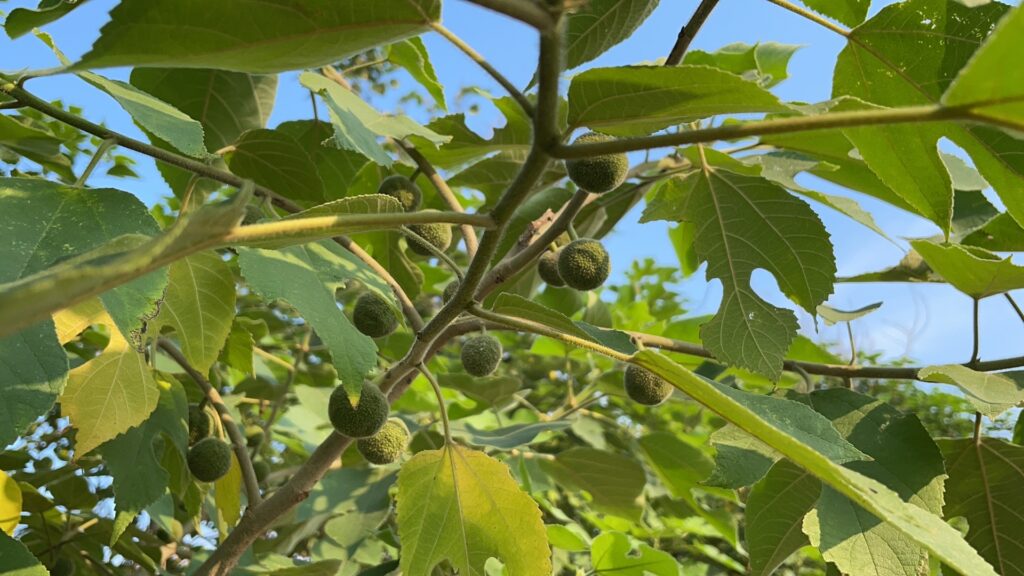
3
Chinese National Blood Lead Diagnostic Criteria:
Equal to or greater than 100 μg/liter, for lead poisoning
We generally use the blood lead concentration index (μg/100ml) or ppm (divide the following numbers by 10) as a measure of the degree of lead poisoning, and the blood lead levels and the harm they cause are as follows:
10: Safe
40: overproduction of aminolevulinic acid – indigestion, inattention, headache and nausea
80: Excessive secretion of aminolevulinic acid and metabolism of multiple by-products – acute diarrhea, anemia, depression
100: Weakness of peripheral nervous system and central nervous system disorders – insomnia, tingling in extremities, sexual dysfunction
Above 150: Lead toxic brain swelling and permanent damage – convulsions, paralysis, hallucinations, blindness
Radiating out from the center of the Tianneng Group, there are 25 villages with more than 30,000 people within two kilometers. The villagers have reported that the environment of the industrial park is getting worse and worse, with foul odors coming from time to time, and the staff of the park also suffers from a lot of illnesses. Moreover, companies in the park frequently emit irritating gases at night.
Investigators visited the site in 2021 and took samples of wheat and other plants and soil from five villages in the vicinity of the industrial park, namely, Luanchanghu Village (0.55km from the industrial park), Zhou Village (1.87km from the industrial park), Dakouzhai Village (1.20km from the industrial park), Xiehezhai Village (1.49km from the industrial park), and Rong Village (1.28km from the industrial park) for The test found that the lead content of plant samples (wheat, tree nuts, honeysuckle, etc.) taken within two kilometers exceeded the standard.
Currently, lead is widely used as an industrial raw material in industrial production, and most of it is discharged into the environment in the form of waste gas, waste water, waste residue, and other forms, resulting in widespread pollution.
When lead fumes in the air reach a certain concentration, it will be harmful to the human body. Even a trace amount of lead can cause irreversible damage to the human body. It may affect kidney function, cause high blood pressure and increase the incidence of cardiovascular disease. The lead that accumulates in a pregnant woman’s body can even affect the fetus in her womb.
Children are the most common victims of lead. The Blacksmith Institute for Environmental Studies in New York found in a study that people who were affected by lead pollution in childhood had low IQs as adults. Moreover, the irreversible adverse effects continue throughout their lives, and there is nothing that existing medical treatments can do about it.
3
Chemical plants stealthily discharge foul odors at night, making the stench ubiquitous.
Villagers say there are twenty to thirty cases of cerebral infarction in every village.

Local villagers
Villagers near the industrial park expressed their frustration and helplessness to researchers. Since the Tianeng Battery Factory moved there in 2011, it has continuously released foul odors day after day. More factories like Dongfang Yuhong and Longdeyang New Materials have arrived, making the air indescribably worse.
A man working at Tianeng Battery Factory said the paint smell inside the factory was strong, so he was responsible for installing exhaust fans to alleviate the situation.
In Zhou Village, about 1.87 km from the Tianeng Battery Factory, the situation is similar, with villagers suffering from the factory’s emissions. Rong Village residents, cooling off by the roadside, reported that since various factories arrived, the village of over 800 people has seen twenty to thirty cases of cerebral palsy, with four to five hundred suffering from high blood pressure, and others from liver and lung cancer.
Villager Xiao Li from Xihezhai Village noticed the unbearable smell during his trial work day at the factory and decided against working there. Villagers have noticed chemical plants releasing foul odors at night, around 9 or 11 PM, making it impossible to avoid the toxic air.
After the introduction of businesses through investment promotion to Puyang, what benefits have they actually brought to the local people? Interviewee Mr. Wang sighed and angrily said, “What benefits have they brought us? They can’t even ensure our health.”
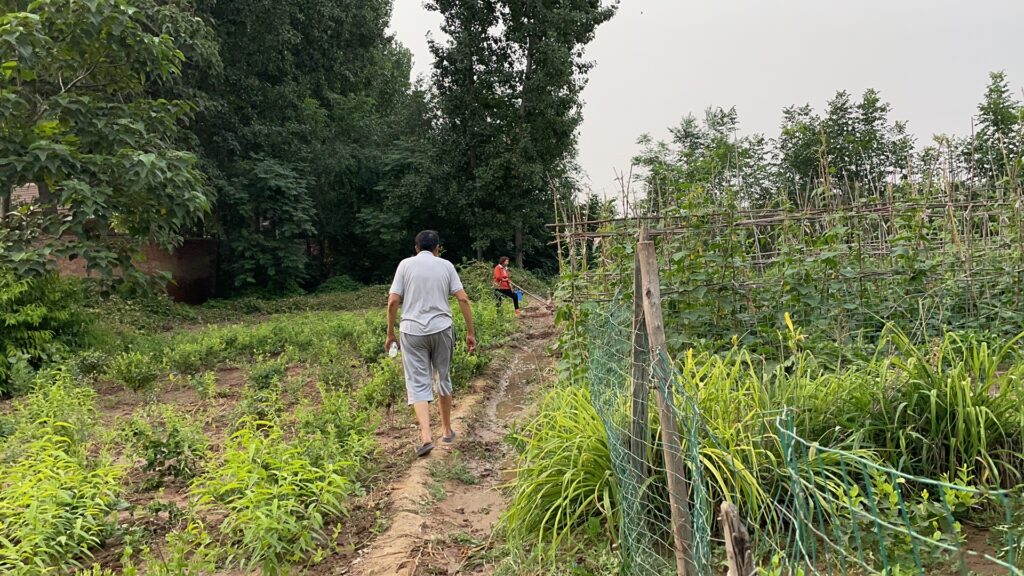
4
Pollution Refugees:
The villages promised relocation by 2018 are still mostly unsettled by 2022


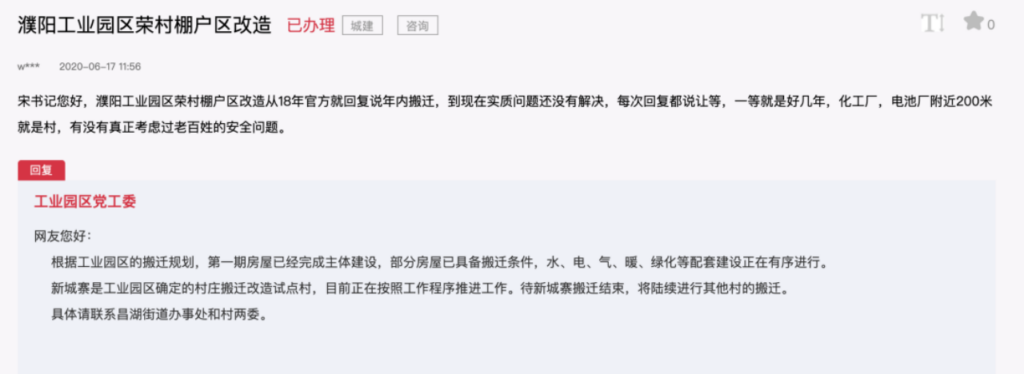
Crops and soil in the village have severe lead contamination, compounded by unbearable chemical odors, prompting villagers to demand relocation.
According to information publicly available on the government website, the relocation plan for villages around the industrial park began in 2017. The first batch of planned relocations includes six villages: Lixin, Rongcun, Xujiazhuang, Huangchanghu, Luanchanghu, and Hanchanghu. Construction began in 2015 and 2016 respectively, with plans for relocation and occupancy by June 2018. The second batch of ten villages (Dakouzhai, Zhoucun, Ximeian, Xinchengzhai, Hujiapai, Matou, Wujia, Wuguai, Dahezhai, and Xihezhai) started construction in June 2017.
However, investigators found in 2021 that new chemical factories are under construction, and the industrial park is expanding, getting closer to the villages. However, the relocation of the first batch of villages has still not been implemented. As of 2022, the planned relocations of Rongcun, Xujiazhuang, Hanchanghu, Huangchanghu, and Luanchanghu villages have not been carried out as stated by the authorities.
An example of relocating villages is as follows: In the late 1990s, the chemical industry in Wangxi Road, Taizhou, Zhejiang, reached its peak, with over a hundred various-sized chemical enterprises, contributing to one-third of the city’s total production value and tax revenue. Since then, the demand from local residents for the chemical industry to relocate has been increasing. The village of Qieyantou, closest to the chemical zone, had over 1,700 residents and began requesting relocation in the 1990s. In 2004, ten years later, the municipal government finally approved the request and relocated the village two kilometers southwest.
However, merely relocating factories instead of people is not a long-term solution. In 2005, Taizhou City, Zhejiang Province, finally determined to relocate the polluting chemical enterprises.
5
“Reliable Assistant” for Family Planning:
Some villagers said that regardless of gender, working in a battery factory affects fertility.
Scientific research has shown a high correlation between lead exposure and infertility.
Despite the prolonged delay in relocation, villagers have discovered that working at the Tianeng Battery Factory affects fertility, which is also why the factory is hesitant to hire unmarried employees.
Mr. Li, a resident of Rong Village, told investigators, “In order to make money, even though we know the working environment in the battery factory is poor, but the salary is relatively high, plus overtime pay of seven to eight thousand yuan. Some people still work there. After working for three years, once lead contamination is detected, they quit because their bodies can’t handle it anymore.”
Some villagers also say, “Those who work at the Tianeng Battery Factory are those who don’t intend to have children. Regardless of gender, after working there, they will lose their fertility.”
What villagers may not realize is that the “scissors” of family planning have extended from within the factory to outside. In Luanchanghu Village, 550 meters from the Tianeng Battery Factory, Aunt Huang’s daughter-in-law was pregnant before but had no fetal heartbeat after three months and had to undergo an abortion. Such cases are not isolated.
Scientific research has shown a high correlation between lead exposure and infertility. The results of a study published in the Journal of Life Sciences indicate that blood lead levels in the infertility group (average 130.0 µg/L) were significantly higher than those in the general normal group of women (average 78 µg/L). Occupational groups regularly exposed to heavy metals like lead (such as dental workers) have lower successful fertility rates than the general population.
83-year-old Uncle Niu sits under a guava tree by the sesame field with a hoe beside him. The factory is just 200 meters away. Uncle Niu sighs, saying that lead pollution not only prevents people from reproducing but also renders the land beneath their feet infertile. “Even if we plant beans, they only have shells and no beans. The same goes for corn; there are no seeds.”And this is the reason why he started growing sesame.
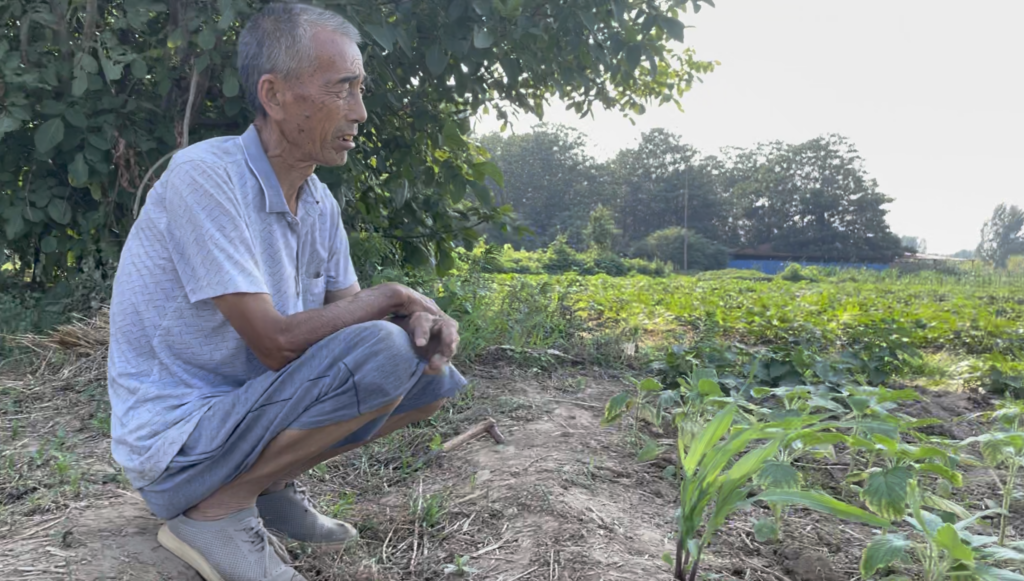
Related reading:
Caijing Magazine | The Dilemma of Relocation in Puyang Industrial Park: https://weekly.caixin.com/m/2022-11-12/101963944.html